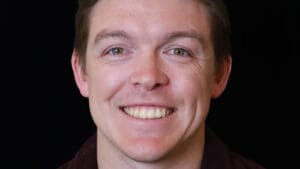Quinton Maki is a Software Engineer II at Amazon Web Services and a respected mentor within the tech community. His path into software engineering wasn’t traditional.
Born in 1996 and raised in California, he began his journey as a long-distance runner, competing with the Calabasas Cheetahs and later with the Reseda High School track team. Coaching young athletes in his teens taught him leadership, patience, and the power of persistence—qualities that continue to guide his work today.
In 2021, after several years in the workforce, Quinton joined Hack Reactor, a top coding bootcamp in San Francisco. He graduated at the top of his class and went on to teach there before joining Amazon Web Services. He was promoted to Software Engineer II within a year, one of the fastest promotions in the organization’s history.
Quinton is known for his ability to simplify complex ideas and support others in reaching their goals. He has mentored more than a dozen engineers and champions a growth mindset that values reflection, learning from failure, and self-awareness.
Outside work, he enjoys snowboarding in Lake Tahoe, sailing on the San Francisco Bay, and volunteering at community food banks. His career reflects a balance of discipline, curiosity, and purpose. For Quinton, success means measurable progress achieved without compromising values or well-being—a belief that continues to shape his career and inspire those around him.
Q&A with Quinton Maki
Can you tell us a bit about your background and what you do now?
I’m a Software Engineer II at Amazon Web Services, where I focus on building and improving internal systems. My path into tech wasn’t the usual one. I didn’t study computer science at university—instead, I worked for several years before enrolling in Hack Reactor, a coding bootcamp in San Francisco. I finished top of my class, taught there for a bit, and then joined AWS. I was promoted to my current role within a year, one of the fastest promotions in the organization.
What first drew you to technology?
I’ve always enjoyed problem-solving. When I discovered coding, it reminded me of running long-distance races—small, consistent improvements make all the difference. It’s analytical, but it’s also creative. You get to build something from nothing and see instant feedback on what works and what doesn’t.
You were a coach before becoming an engineer. How has that influenced your approach to leadership?
Coaching taught me how to listen and break things down into small, manageable steps. As a teenager, I coached hundreds of kids on a youth track team. That experience helps me now when mentoring engineers. Everyone learns differently, and patience is key.
You’ve mentioned that you check in with yourself regularly. How does that help you professionally?
Every few months, I ask myself three questions: Where am I now? Where am I going? Who am I going with? If two out of three feel right, I know I’m in a good place. It’s a simple way to make sure I’m growing and surrounded by people who support that growth.
Imposter syndrome is common in tech. How do you manage it?
It’s definitely something most engineers face. When it hits, I give myself space—usually 24 to 48 hours. Most of the time, those feelings fade once you’ve had time to breathe. It’s also helped to talk to peers. Everyone struggles at times, even people who look confident.
What’s been one of your most important lessons since joining AWS?
That failure is part of the process. The job is really about testing, iterating, and learning. Once you stop fearing failure, you can start enjoying the challenge. I’ve had plenty of code break on me, but that’s where I’ve learned the most.
You’ve advanced quickly in your career. What do you think helped you stand out?
Curiosity and consistency. I ask a lot of questions and try to understand the “why” behind everything. I also think my background outside of tech—coaching, retail, athletics—gave me a different perspective on teamwork and resilience.
Outside work, how do you unwind or recharge?
Snowboarding has become a huge part of my life. I started in 2023 and now go almost every weekend in the winter, usually to Lake Tahoe. I’ve met some great people on the Sports Basement bus up there. In summer, I enjoy sailing and being outdoors—it clears my head.
What advice would you give to someone starting out in software engineering?
Ask for help early and often. You’ll get further, faster, if you learn from people around you. Drop the ego—it’s not about knowing everything, it’s about learning continuously.
What’s next for you?
I want to keep growing as both an engineer and a mentor. My goal is to help others find confidence in their work and to keep building systems that make a difference. I don’t know exactly where I’ll be in five years, but as long as I’m learning and contributing, I’ll be happy.

